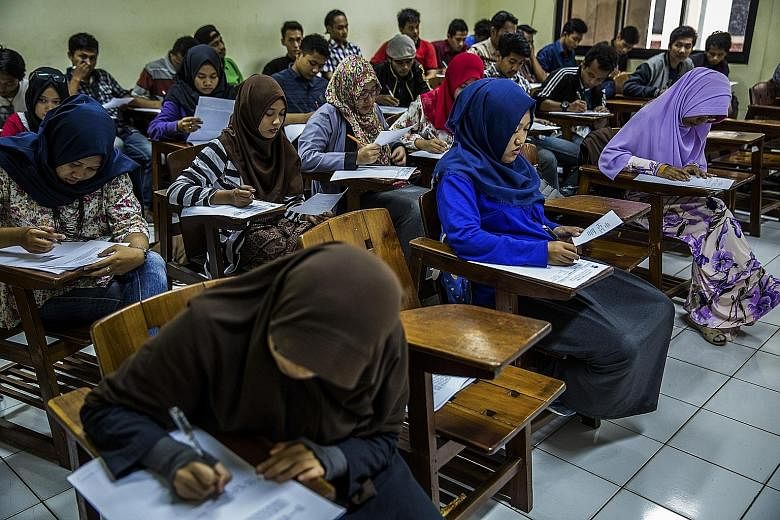JAKARTA • Indonesia has a shortage of skilled workers - in fields ranging from medical services to agriculture - and will need tens of millions more in the coming decades.
It particularly needs more engineers, a problem that could thwart President Joko Widodo's ambitious plans to upgrade Indonesia's outdated infrastructure.
The challenge is daunting. Fewer than 10 per cent of Indonesia's 250 million people have a university- level education, according to a 2015 national labour force survey conducted by the Indonesian Central Statistics Bureau.
Most Indonesians who do have university degrees work as teachers, according to data from the Asian Development Bank. Just 8 per cent are engineers.
Yet, of Indonesia's six million university and postgraduate students, as many as 20 per cent are majoring in Islamic studies, according to the Ministry of Research, Technology and Higher Education.
Mr Rajiv Biswas, Asia-Pacific chief economist for London-based IHS Economics, said that producing more skilled workers, including engineers and technicians, should be "one of the key strategic priorities for the Indonesian government over the next decade".
"Indonesia is estimated to have an annual shortage of around 30,000 engineering graduates per year, and this is a key hurdle to infrastructure development and the growth of the manufacturing industry," he said.
The country is estimated to have 57 million skilled workers now, and would need 113 million by 2030 based on current growth rates, Mr Biswas said.
Analysts say that this imbalance of professional talent is hampering Mr Joko's government as he attempts, with great fanfare, to carry out hundreds of billions of dollars' worth of nationwide infrastructure projects, ranging from airports to highways and new power plants.
"The problem is quality skills and productivity," said Mr Eko Prasetyo, president director of the Education Fund Management Institution, an arm of the Indonesian Ministry of Finance that has awarded more than 15,000 postgraduate scholarships since 2013.
"We have to produce more engineers. We have to produce more researchers," he said. "We can't just be an economy led by natural resources."
The situation is improving. For instance, the number of Indonesians who finished primary school jumped to 57 per cent last year from 40 per cent in 2002, according to government figures.
And the proportion of college- age Indonesians attending university has risen to 25 per cent from 20 per cent in the past decade.
But analysts say much more is needed. "In terms of quantity, that's a lot of achievement," said Mr Sutarum Wiryono, an education senior project officer at the Asian Development Bank.
"But in terms of quality, it is not."
NYTIMES

